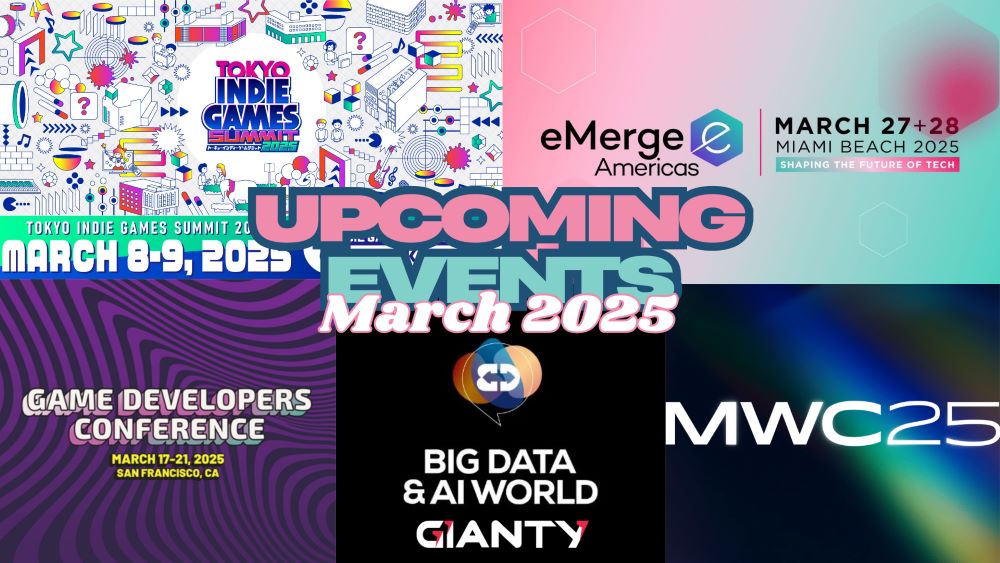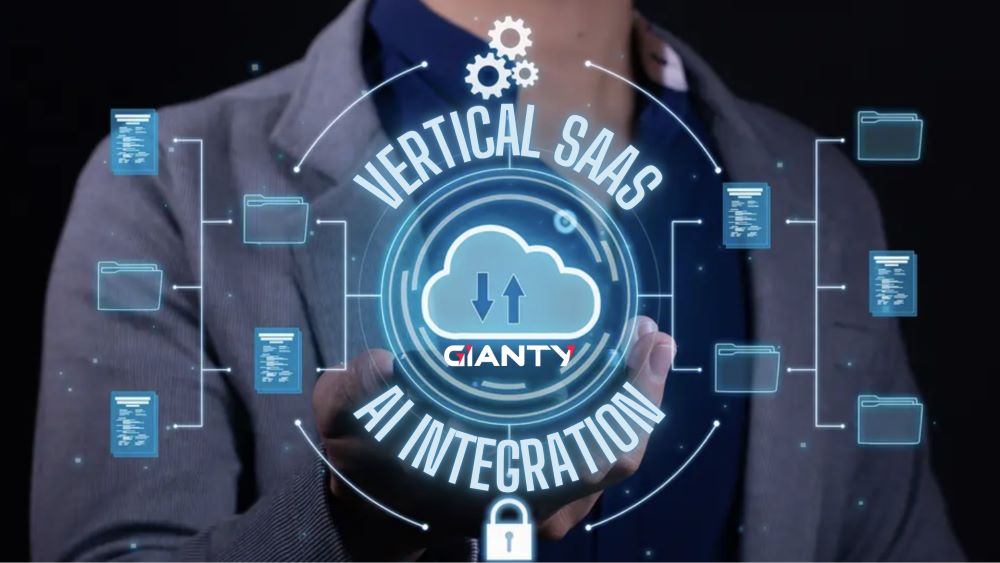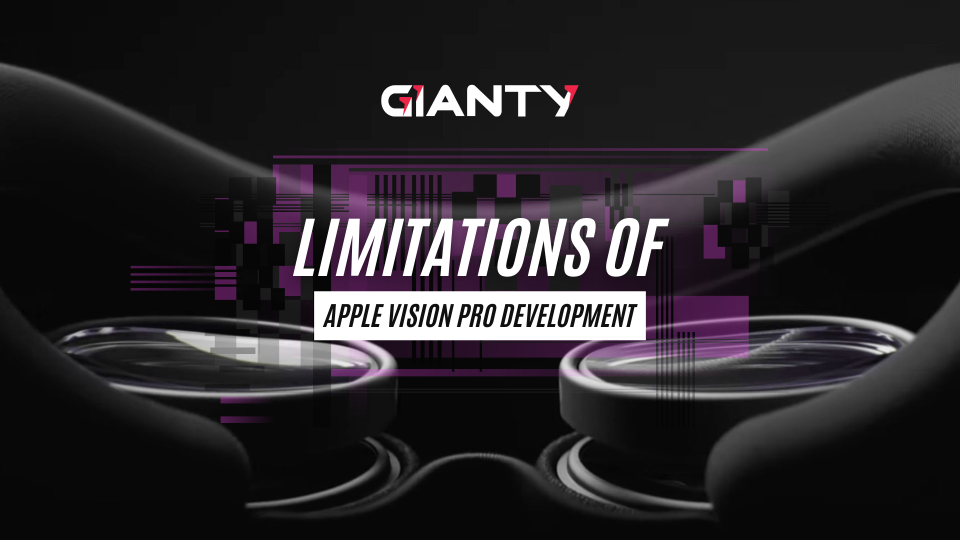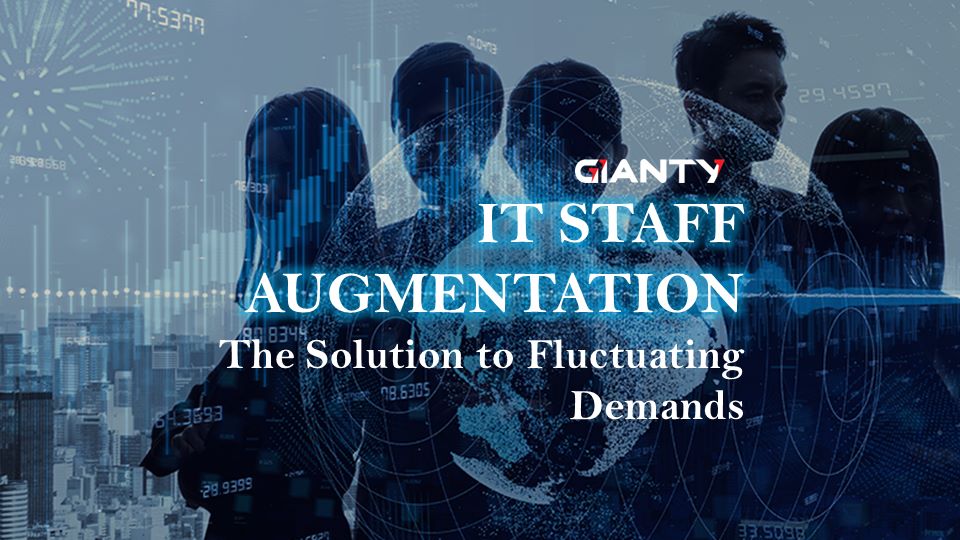Artificial intelligence has revolutionized various industries in recent years, impacting how businesses operate and professionals perform their duties.
As AI technology continues to evolve, a new wave of innovation is emerging: vertical AI agents.
This concept refers to specialized tools that are finely tuned to handle tasks within specific industries or business functions, addressing unique challenges and optimizing workflows in ways that general-purpose AI may not fully achieve.
Unlike general-purpose AI, which offers broad capabilities, vertical AI agents possess industry-specific expertise, enabling them to address unique challenges and automate tasks with greater precision and efficiency.
The global vertical AI market, valued at USD 10.2 billion in 2024, is expected to grow at a CAGR of 21.6% from 2025 to 2034, driven by the increasing demand for AI industry-specific solutions in sectors like healthcare, finance, and manufacturing.
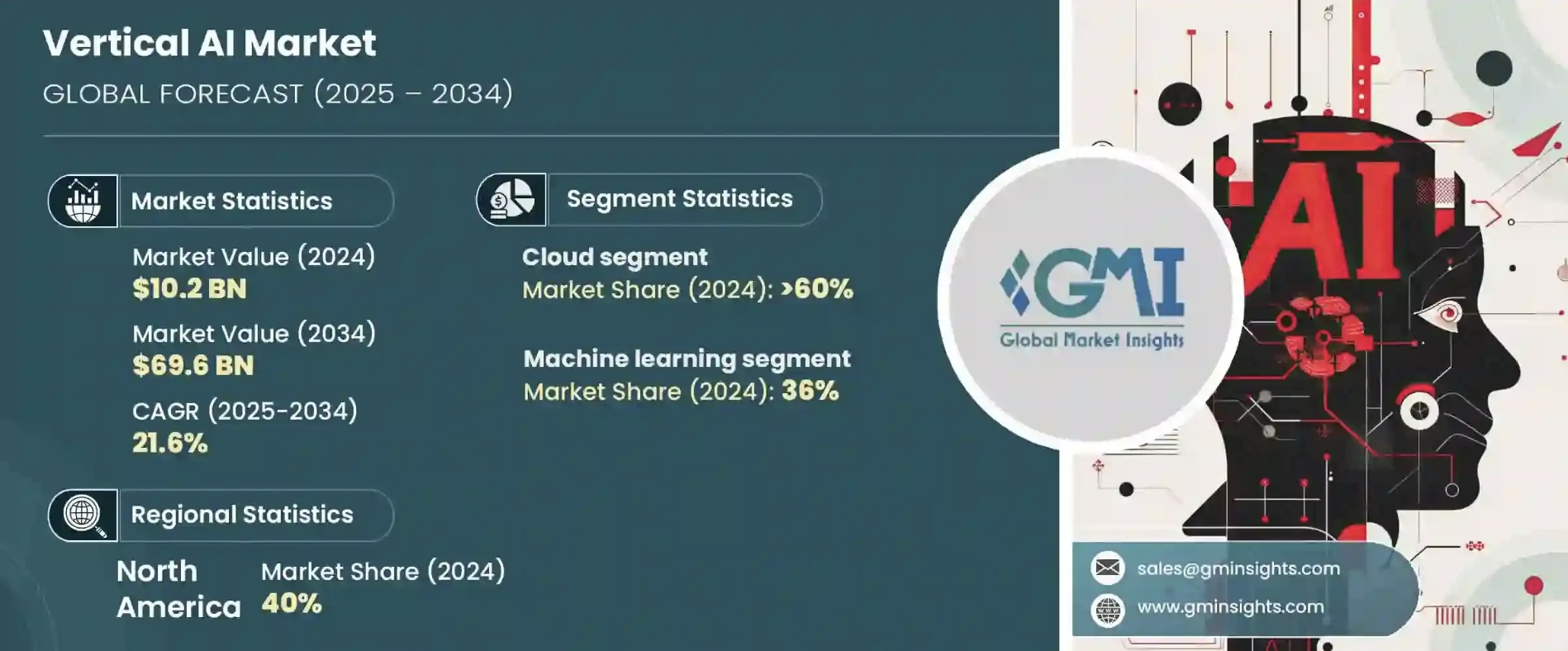
At GIANTY, we are eager to witness the continued development of vertical AI agents, especially as AI development is one of the many services we offer. Our expertise in AI allows us to stay ahead of the curve and contribute to innovations that will drive industries forward.
In this post, we’ll explore the power of vertical AI agents, how they differ from more general AI solutions, and why professionals should consider adopting these tools to elevate their operations and enhance productivity.
1. Understanding Vertical AI Agents
Vertical AI agents are specialized AI tools designed for specific sectors or business functions, bringing deep expertise to niche areas within specific industries.
In contrast to general-purpose AI agents that lack industry-specific depth, vertical AI agents are equipped with the knowledge and capabilities that cater to the unique needs of an individual sector.
This specialization allows vertical AI agents to provide more accurate insights, make better predictions, and automate complex tasks more effectively within their designated sectors.
Key Characteristics of Vertical AI Agents:
- Specialization: Vertical AI agents are designed to handle tasks and workflows unique to specific industries, such as fraud detection in finance or personalized education in education. This specialization enhances accuracy and efficiency in addressing industry-specific challenges.
- Deep Industry Knowledge: These AI agents are programmed with detailed, domain-specific information, allowing them to understand and interpret industry-specific data more effectively. This deep knowledge leads to more accurate insights and better decision-making.
- Tailored Functions: Vertical AI systems are created to perform specialized tasks, such as legal document analysis in the legal industry or patient diagnosis in healthcare, ensuring that the solution perfectly aligns with industry requirements.
Comparison with General-Purpose AI Agents
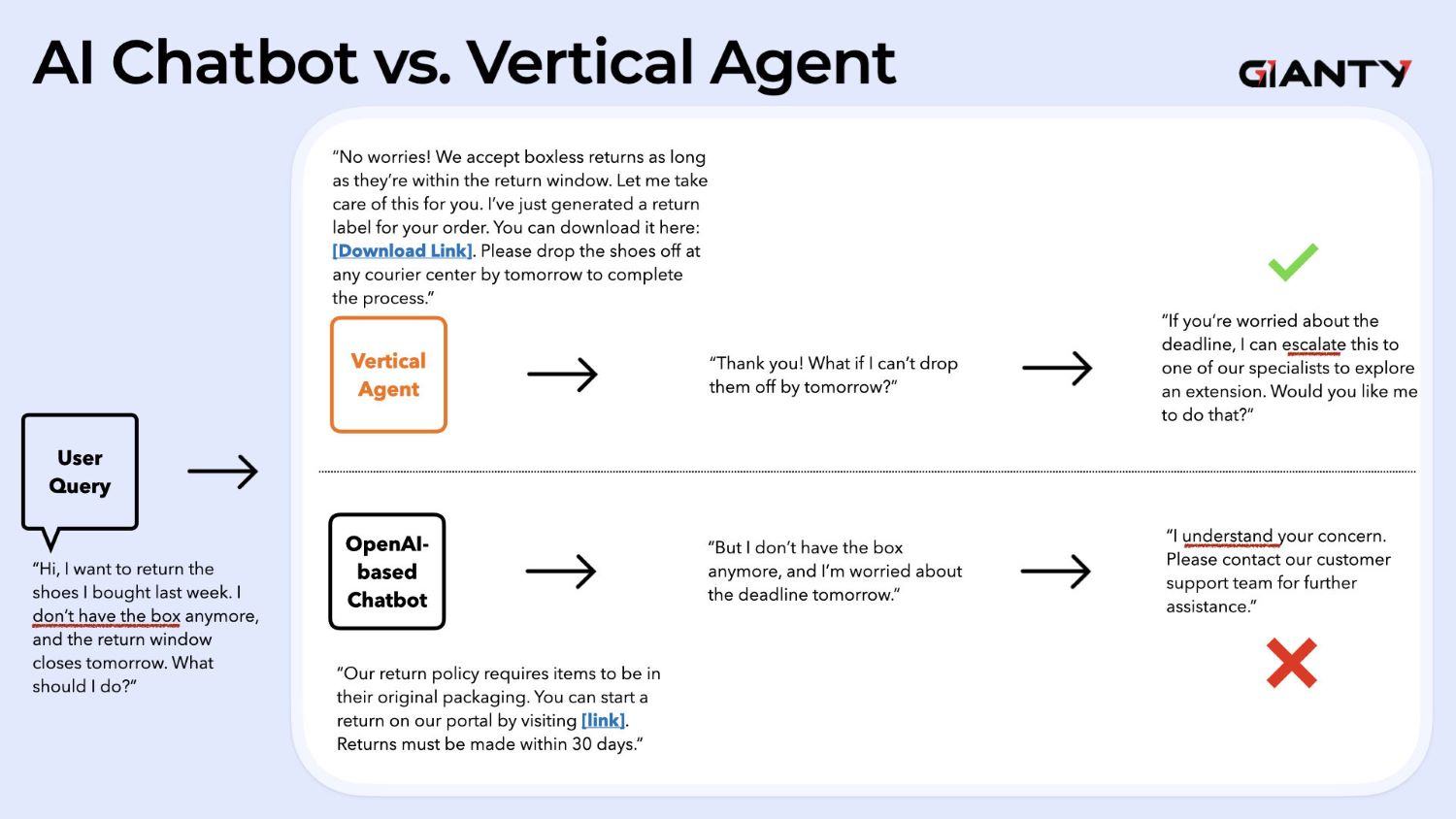
General-Purpose AI
While general-purpose AI agents are versatile, their broad focus can lead to less precise insights and potentially overlook crucial nuances.
They are capable of automating basic tasks across various industries but often lack the deep domain expertise necessary for complex or highly specialized tasks.
Vertical AI
In contrast, vertical AI agents excel in their targeted areas, offering tools that automate complex tasks, provide deep insights, and significantly increase efficiency within specific business or industry needs.
This specialization allows vertical AI agents to outperform general-purpose AI in tasks that demand deep domain knowledge, such as financial risk assessment or medical image analysis.
2. The Business Case for Vertical AI Agents
The adoption of vertical AI agents offers a strong business case, particularly in areas that demand precision, deep insights, and industry-specific knowledge, such as healthcare, finance, and manufacturing. Here are the key value propositions of vertical AI agents for organizations:
Increased Efficiency and Automation
Vertical AI agents can automate repetitive tasks, such as data entry, scheduling, and report generation, freeing up professionals to focus on higher-value activities. Those who have embraced it early on are realizing efficiency boosts ranging from two to five times.
By streamlining processes, such as customer service interactions, data entry and processing, and even some aspects of financial risk assessment, vertical AI agents help organizations reduce the time spent on manual work.
Cost Reduction
AI adoption is driving significant cost reductions across sectors, with 41% of companies in supply chain management reporting savings of 10-19% and 33% utilizing generative AI to cut costs.
For instance, in finance, vertical AI agents automate tasks such as risk assessments and credit evaluations, further reducing operational costs and human labor while improving efficiency and accuracy.
Enhanced Decision-Making
With vertical AI’s industry-specific insights, professionals can make more informed and data-driven decisions.
Whether it’s predicting market trends, recommending the best course of treatment for a patient, or identifying optimal inventory levels in manufacturing, vertical AI agents provide actionable intelligence that is tailored to the specific demands of the industry.
3. Vertical AI Agents in Key Industries
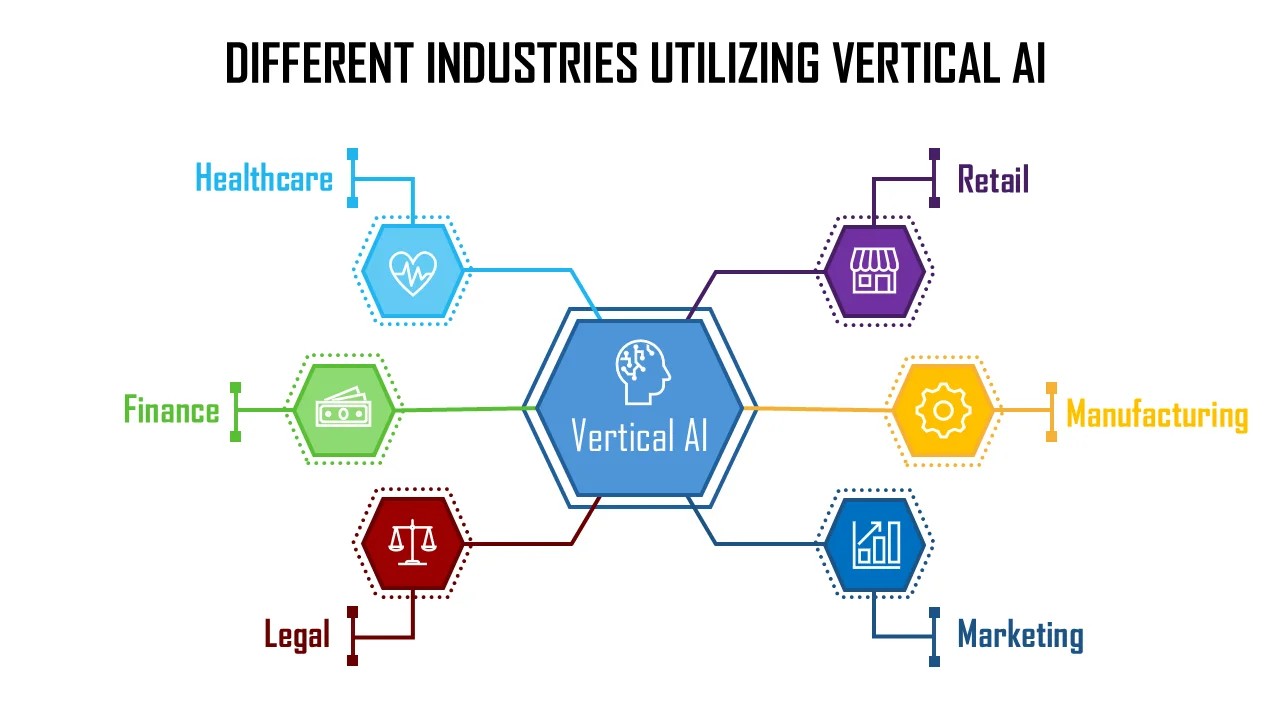
Vertical AI agents transform a wide range of industries by enabling specialized solutions for complex challenges.
Healthcare
In healthcare, vertical AI agents go beyond general AI by using deep domain-specific knowledge to assist in diagnosing diseases, analyzing medical records, and interpreting medical images.
These agents improve the accuracy of diagnoses, predict patient outcomes, and even recommend personalized treatment plans.
By automating routine tasks like data entry and patient scheduling, vertical AI agents help healthcare providers save time and reduce administrative overhead.
Finance
Vertical AI agents in the financial sector focus on analyzing complex financial data, identifying patterns in market trends, and assessing risks.
For example, a vertical AI agent might specialize in fraud detection, helping financial institutions pinpoint fraudulent transactions faster and with greater precision.
These agents assist in tasks such as credit scoring, risk management, and portfolio optimization, offering more accurate and personalized solutions than general AI tools.
Legal
Vertical AI agents in the legal industry are equipped with specialized knowledge of legal terminology, case law, and precedents. They assist with document analysis, legal research, and even predicting case outcomes.
By automating tasks that would typically require significant human expertise, such as contract review or compliance checks, vertical AI agents streamline workflows and help law firms deliver faster, more accurate services to clients.
Retail
Retailers are leveraging vertical AI agents to better understand customer behavior, personalize shopping experiences, and optimize inventory management. These agents can analyze consumer data in real time to recommend products, adjust pricing strategies, and forecast demand.
By automating tasks like order processing and customer service, vertical AI agents enable retailers to deliver more personalized, efficient, and profitable experiences for their customers.
Manufacturing
In manufacturing, vertical AI agents are revolutionizing production processes. These agents specialize in predictive maintenance, quality control, and supply chain optimization.
By analyzing data from sensors on production lines, vertical AI agents can predict when machines are likely to fail, preventing costly breakdowns. They can also detect defects in products and recommend improvements, ensuring higher product quality and reducing waste.
Marketing
In marketing, vertical AI agents effectively leverage their deep understanding of customer behavior and market trends. They utilize data to precisely identify unique customer segments and deliver highly personalized campaigns.
This results in targeted campaigns that resonate with customers, driving significant improvements in ROI, customer engagement, and brand loyalty.
4. Real-World Examples of Vertical AI Agent Usage
Several industries are already reaping the rewards of vertical AI agents:
Revolutionizing Healthcare Diagnostics with PathAI
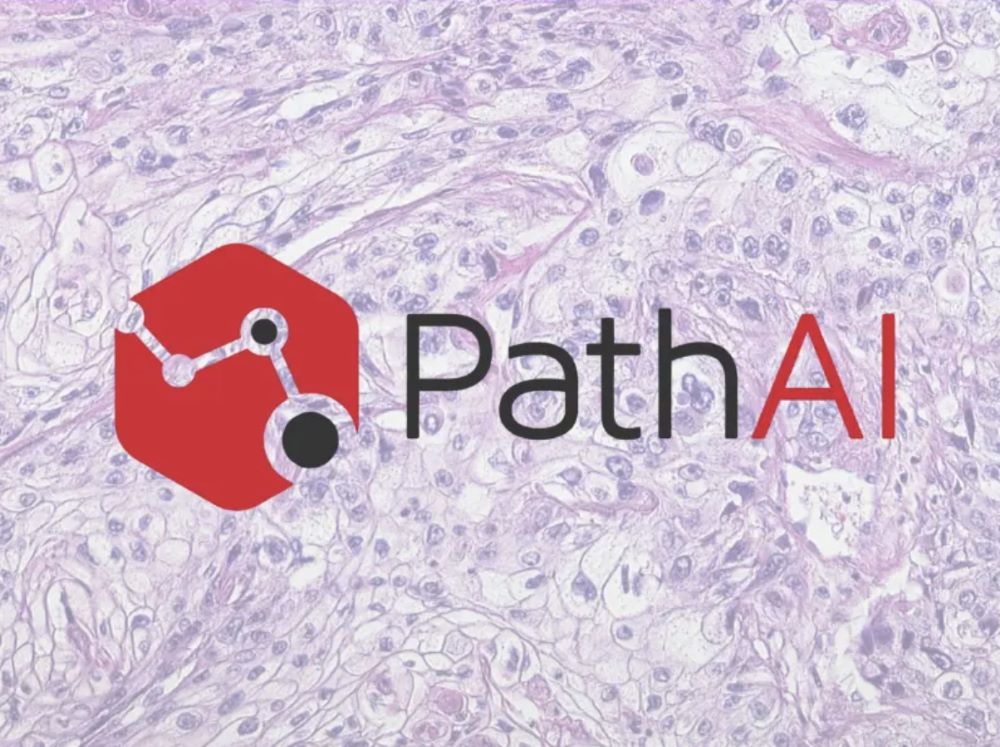
PathAI is at the forefront of using vertical AI in healthcare. This company develops AI-powered tools that assist pathologists in diagnosing diseases more accurately.
These agents analyze whole-slide images of tissue samples, identifying patterns indicative of diseases like cancer.
By providing pathologists with AI-driven insights, PathAI’s vertical AI agents enhance diagnostic accuracy and reduce the risk of misdiagnosis, leading to better treatment outcomes for patients.
- Impact: PathAI’s tools help pathologists reduce diagnostic errors, improving treatment planning and enabling earlier detection of diseases, leading to more accurate diagnoses and better patient outcomes.
- Real-World Application: PathAI has partnered with leading hospitals and research institutions globally, to deploy its AI system for diagnosing a variety of conditions, from cancer to rare diseases, improving both speed and accuracy.
Revolutionizing Credit Scoring with Zest AI
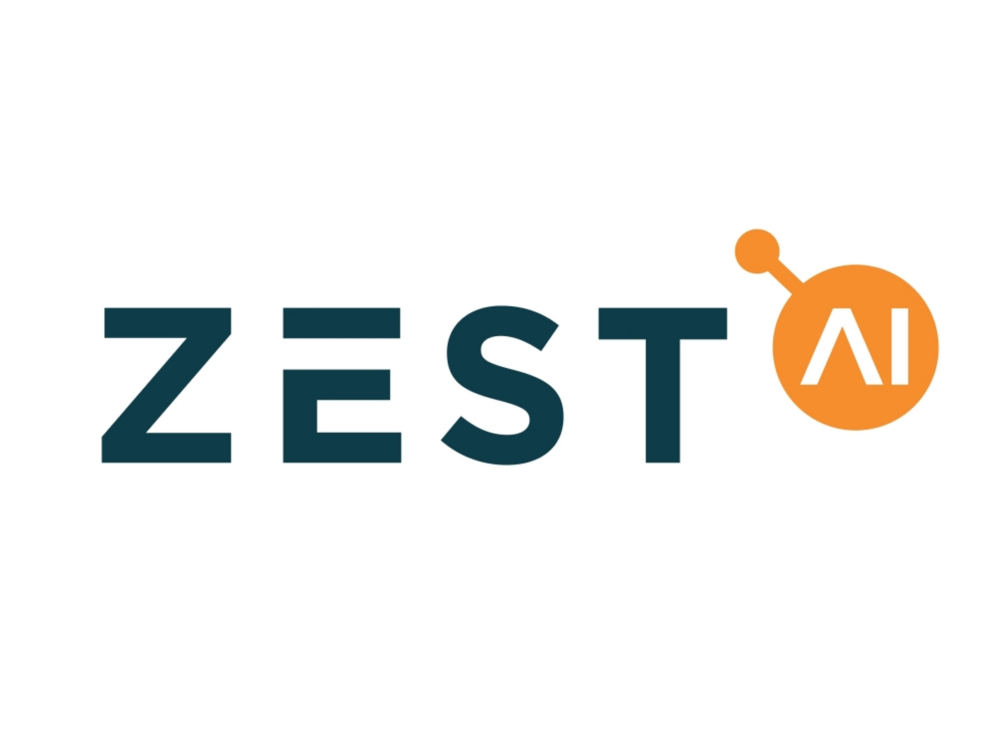
Zest AI has developed a vertical AI agent that revolutionizes credit scoring. Using machine learning algorithms, this AI agent analyzes a broader range of data than traditional methods, including transaction history and social behavior.
By providing lenders with more accurate and fair credit assessments, Zest AI’s agent helps expand access to credit for underserved populations and reduces the risk of loan defaults.
- Impact: Zest AI helps financial institutions reduce the risk of loan defaults and expand access to credit for underserved populations.
- Real-World Application: Zest AI has partnered with major financial institutions to deploy its AI-driven credit scoring system, improving lending decisions and financial inclusivity.
5. Challenges and Considerations for Professionals
While vertical AI agents offer immense benefits, there are several challenges that professionals must consider before adopting these tools:
- Data Privacy and Security: Vertical AI agents handle sensitive data, especially in industries like healthcare and finance. Implementing robust data security measures, such as encryption and access controls, and ensuring compliance with relevant data privacy regulations, such as the GDPR or HIPAA, is essential.
- Integration with Existing Systems: Integrating vertical AI agents with legacy systems can be complex and resource-intensive, such as integrating AI systems with existing databases, CRM systems, and other enterprise software.
- Adoption Barriers: The cost of implementing AI solutions, including high upfront costs for AI software and hardware, the need for retraining staff, and the potential for job displacement due to automation, can create adoption hurdles for some organizations.
Addressing these challenges is crucial for ensuring the successful adoption and ethical use of vertical AI agents or even AI in general while maximizing its benefits.
Efficiency at the Expense of Oversight?
As vertical AI advances, its potential to revolutionize industries grows, but it also raises serious concerns.
These specialized systems could become so integrated into daily operations that their influence on critical decisions in areas such as healthcare, finance, and criminal justice may outpace human oversight.
While they offer efficiency and innovation, they also pose risks, such as reinforcing existing societal biases in lending practices, making discriminatory hiring decisions, or using AI in autonomous weapons systems.
The growing interdependence of vertical AI agents with technologies like the Internet of Things (IoT) and blockchain could create vulnerabilities to cyberattacks and data breaches, while the use of AI in blockchain technology could exacerbate issues of transparency and accountability.
As AI systems become more deeply integrated into decision-making processes, the line between human judgment and machine-driven outcomes may become increasingly blurred, raising questions about control and accountability.
Ultimately, while vertical AI agents promise new opportunities, they also present a future where the risks of unchecked growth may outweigh the rewards. The evolution of vertical AI will test our ability to govern and adapt responsibly.



